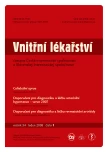Monitoring age-dependent effect of anticoagulation treatment in patients with atrial fibrillation
Authors:
T. Hnátek; D. Zogala; L. Kamenik; I. Kotík; I. Jeřábek; M. Zavoral
Authors‘ workplace:
Kardiologické oddělení Interní kliniky 1. lékařské fakulty UK a ÚVN Praha, přednosta doc. MUDr. Miroslav Zavoral, Ph. D.
Published in:
Vnitř Lék 2008; 54(1): 21-24
Category:
Original Contributions
Overview
Oral anticoagulation treatment with dicumarol preparations (warfarin sodium) is the standard in patients with atrial fibrillation. The effect of treatment depends on many factors, especially in elderly patients. In the study, we assessed the effect of treatment in patients with atrial fibrillation hospitalized in our cardiology ward from 2004 to 2005, in the form of a telephone survey (who controlled the treatment – general practitioner or internist?, the last 2 INR results, complications). INR 2.0–3.5 is considered an efficient therapeutic range. The proportion of permanently correctly anticoagulated patients is approximately 47 % across the whole age range, the hypothesis of lower efficiency of treatment in elderly patients does not apply (48 % of efficiently anticoagulated patients younger than 75 years vs. 46 % of older patients – however, the study does not include polymorbid patients who could not take warfarin at all!) The fact whether a patient is monitored by a general practitioner or an outpatient specialist does not make any difference (49 % of anticoagulated patients monitored by a general practitioner vs. 52 % of patients monitored by an internist). The percentage of severe complications is relatively low (3.4 %).
Keywords:
atrial fibrillation – warfarin – anticoagulation treatment
Sources
1. Jones M, McEvan P, Morgan C et al. Evaluation of the pattern of treatment, level of anticoagulation control, and outcome of treatment with warfarin in patients non-valvular atrial fibrillation: a record linkage study in a large British population. Heart 2005; 91 : 472-477.
2. Ezekowitz M, Falk R. The Increasing Need for Anticoagulant Therapy to Prevent Stroke in Patients With Atrial Fibrillation. Mayo Clinic Proceedings 2004; 79 : 904-913.
3. Reynolds M, Fahrbach K, Hauch O et al. Warfarin Anticoagulation and Outcomes in Patients With Atrial Fibrillation. Chest 2004; 126 : 1938-1945.
4. Aschermann M et. al. Kardiologie. Praha: Galén 2004.
5. Margaret F, Chang Y, Hylek E et al. Advanced Age, Anticoagulation Intensity, and Risk for Intracranial Hemorrhage among Patients Taking Warfarin for Atrial Fibrillation. Ann Intern Med2004; 141 : 745-752.
6. Gullov A, Koefoed B, Petersen P et al. Bleeding During Warfarin and Aspirin Therapy in Patients With Atrial Fibrillation (The AFASAK 2 Study). Arch Intern Med 1999; 159 : 1322-1328.
7. Palareti G, Hirsch J, Legnani C et al. Oral Anticoagulation Treatment in the Elderly. Arch Intern Med 2000; 160 : 470-478.
8. Buresly K, Eisenberg MJ, Zhang X et al. Bleeding complications associated with combinations of aspirin, thienopyridine derivatives, and warfarin in elderly patients following acute myocardial infarction. Arch Intern Med 2005; 165 : 784-789.
Labels
Diabetology Endocrinology Internal medicineArticle was published in
Internal Medicine

2008 Issue 1
-
All articles in this issue
- Monitoring age-dependent effect of anticoagulation treatment in patients with atrial fibrillation
- Positive tests for serum anti-endomisium antibodies (AEA) and anti-jejunal antibodies (JAB) and histopathological diagnosis of celiac disease in children
- Assessment of plasmatic cell proliferation and apoptosis indexes in the course of multiple myeloma
- Conventional treatment of atrial fibrillation in the Czech Republic managed by outpatient cardiologists. Overview of diagnostic and treatment procedures, pharmacological treatment and hospitalisation.
- The use of galactomannan detection in diagnosing invasive aspergilosis in hemato-oncological patients
- Differentiated approach to prescription of physical activity in patients with left ventricular dysfunction
- Statin pharmacokinetics
- The treatment of Waldenström macroglobulinemia and the therapy of diseases caused by monoclonal IgM gammaglobulin
- Recommendations of Czech Rheumatological Society for the treatment of rheumatoid arthritis. Efficacy and treatment strategies
- Internal Medicine
- Journal archive
- Current issue
- Online only
- About the journal
Most read in this issue
- The use of galactomannan detection in diagnosing invasive aspergilosis in hemato-oncological patients
- Assessment of plasmatic cell proliferation and apoptosis indexes in the course of multiple myeloma
- Statin pharmacokinetics
- Recommendations of Czech Rheumatological Society for the treatment of rheumatoid arthritis. Efficacy and treatment strategies
